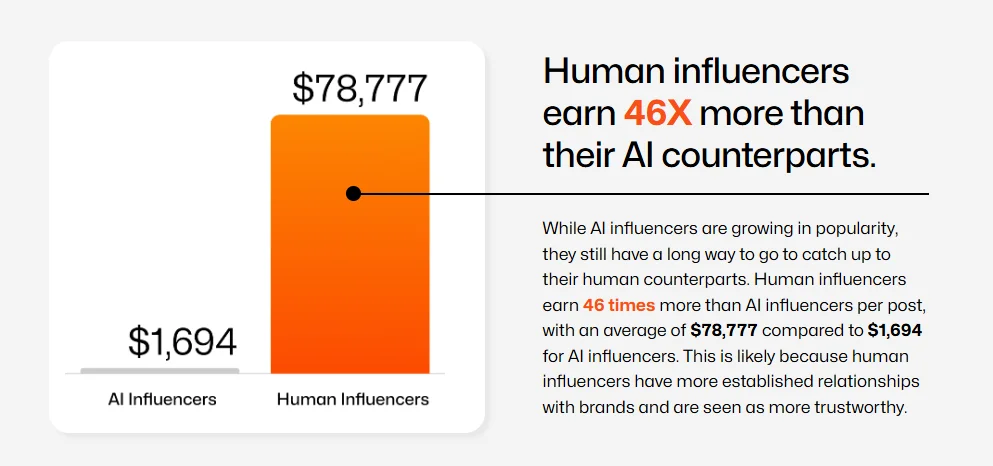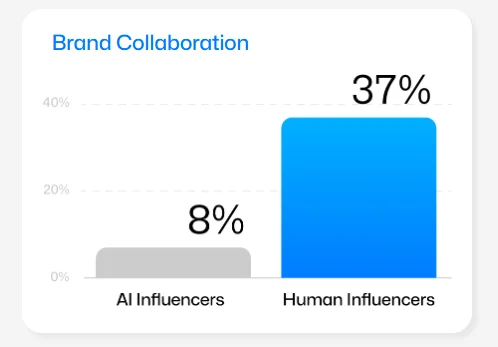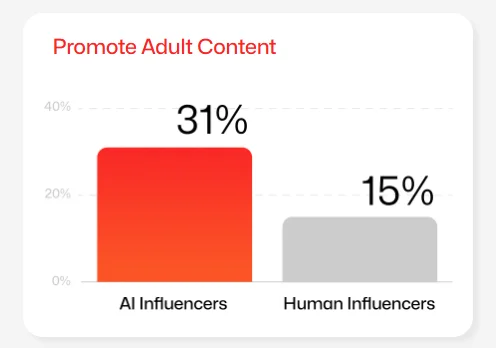AI influencers are making waves and setting trends for 2025. They’re all over social media, creating posts, doing product demos, and more. They work nonstop, create content super fast, and bring a cool, futuristic vibe that grabs attention.
Human influencers, on the other hand, bring something AI can’t—authenticity and relatability. They’ve spent years building real connections with their followers. Their advice feels personal, their content is genuine, and people trust them because they’re, well, human!
So, which one is better for your brand? Feeling unsure? Don’t worry—we’ve got you covered. In this blog, we’ll break down the key features of AI influencers and human influencers to help you decide which one is the perfect fit for your business. Let’s dive in!
What are AI Influencers?
AI influencers are digital avatars powered by advanced artificial intelligence. They’re designed to look, act, and even behave like real humans, creating a unique mix of tech and creativity. These virtual personalities can read scripts, create content, and show products with precision and consistency.
Imagine having an influencer who can produce videos, deliver product demos, and churn out engaging posts—all without ever needing a break or a day off. AI influencers are tireless, cost-effective, and highly customizable, making them a cutting-edge tool for businesses looking to stay ahead in a fast-paced digital world.
Key Features of AI Influencers
1. 24/7 Availability
AI influencers are always online, creating and interacting with audiences around the clock. They don’t require breaks, sleep, or time off, making them ideal for continuous engagement and global campaigns.
2. Customization and Flexibility
AI influencers can be fully customized to match your brand’s look, voice, and style. From their appearance to their personality and tone, they can be designed to perfectly represent your brand's identity and values.
3. Cost-Effective
Once an AI influencer is created, they don’t come with the same costs as human influencers. There's no need for salaries, travel expenses, or long-term contracts, making them a more budget-friendly option for businesses.
4. Consistency
AI influencers are programmed to deliver messages with high accuracy and consistency. They stick to scripts, maintain a steady tone, and follow the same guidelines without any deviation, ensuring your brand messaging is always on point.
5. Scalability
AI influencers can handle multiple campaigns simultaneously, making them scalable for brands looking to reach wider audiences or run larger, more frequent marketing efforts. They can adapt to different platforms and campaigns without missing a beat.
6. Data-Driven Insights
AI influencers can analyze audience data and adjust content in real-time. This allows them to create highly targeted content that resonates with specific demographics, improving engagement and campaign effectiveness.
💡 Learn how to create your own AI avatars and tap into the future of influencer marketing to elevate your brand’s presence!
What are Human Influencers?
Human influencers are real people who use their personal brand to promote products, services, or ideas on social media platforms. They’ve built a strong following by connecting with audiences through authenticity, relatability, and consistent engagement.
Unlike AI influencers, human influencers bring a personal touch that resonates deeply with their followers. They share their lives, opinions, and experiences, which helps build trust and credibility. People follow them not just for their content, but because they feel a connection to the person behind the posts.
Human influencers range from celebrities and industry experts to everyday people who’ve cultivated niche followings. Their ability to form genuine relationships with audiences is what sets them apart from virtual influencers.
Key Features of Human Influencers
1. Authenticity
Human influencers are all about being real. They share their personal stories, ups and downs, and everyday moments that make them feel like someone you can trust. Their authenticity creates a bond that’s hard to break, making their recommendations feel genuine.
2. Emotional Connection
With human influencers, it’s all about that connection. They make you feel like you’re part of their world, whether through storytelling, humor, or just being themselves. That emotional pull is what keeps followers coming back for more and makes their endorsements feel special.
3. Diverse Audiences
From beauty gurus to fitness fanatics, human influencers cover a wide range of topics. No matter what niche your brand fits in, there’s a human influencer out there who’s already talking to your target audience, making it easier for you to connect with the right crowd.
4. Trust and Credibility
People trust human influencers because they know them on a personal level. When a human influencer talks about a product or service, it feels like a recommendation from a friend. That trust and credibility are huge when it comes to making sales and building brand loyalty.
5. Creativity and Flexibility
Human influencers know how to keep things fresh. They understand what works for their audience and can easily adjust their content to reflect trends or new ideas. Their creativity helps your brand stand out in a way that feels organic and exciting.
6. Engagement and Interaction
What’s great about human influencers is that they interact with their followers. Whether it’s responding to comments or hosting live sessions, they make their audience feel seen and heard. This real-time connection boosts engagement and makes brand collaborations feel more personal.
7. Proven Track Record
Human influencers have been around for a long time, and their effectiveness in marketing is well-established. They’ve proven time and again that they can drive engagement, build brand loyalty, and increase sales. With human influencers, you’re tapping into a tried-and-tested strategy that’s already working for many brands.
AI Influencers vs Human Influencers: What Does the Data Say?
AI influencers are on the rise, but how do they compare to their human counterparts? Well, the numbers reveal some interesting insights. Human influencers still lead by a wide margin, but AI influencers are quickly catching up in terms of followers and visibility.
Research by Twicsy shows that human influencers make 46 times more per post than AI influencers, earning around $78,777 compared to just $1,694. This shows how much more brands value human connections, trust, and the authenticity that real people bring to the table.
Source: Twicsy
AI influencers might be growing in popularity, but they’re still far behind when it comes to engagement. Human influencers receive 5.8 times more likes per post than AI influencers.
In fact, sponsored posts from human influencers get 2.7 times more engagement than those from AI influencers. This highlights the power of personal connection, as human influencers are able to spark meaningful conversations with their followers.
Source: Twicsy
AI influencers are still carving their place in the influencer marketing landscape, but they’ve got a long way to go. Only 8% of AI influencers make money by collaborating with brands, while 37% of human influencers do.
It’s clear that human influencers continue to dominate brand partnerships and product promotions, due to their ability to build trust and relatability with audiences.
Source: Twicsy
Despite this, AI influencers aren’t to be underestimated. They’re finding their niche in promoting adult content, with 31% of AI influencers engaging in this type of marketing, compared to only 15% of human influencers.
Source: Twicsy
As AI technology advances, these virtual personalities may become more influential in the long run, but they still have a lot of catching up to do when it comes to brand collaborations and engagement.
AI Influencers vs Human Influencers: Which One is Best for Your Business?
When it comes to choosing between AI influencers and human influencers for your business, it really depends on your influencer marketing goals. If you're looking for authenticity, engagement, and a human touch, human influencers are still the way to go.
They have proven track records of building trust with their audience, creating meaningful connections, and driving brand collaborations. With human influencers, you’re more likely to see higher engagement, more personal interactions, and stronger brand loyalty.
On the other hand, if you're exploring innovative ways to engage your audience and are open to the idea of futuristic, data-driven marketing, AI influencers can be an intriguing choice.
They’re scalable, cost-effective, and can deliver consistent content without the unpredictable nature of human influencers. They’re also great for industries where personalization and emotionally charged content may not be as essential.
In the end, it’s about what fits best with your brand’s values and goals. If you're after a relatable, authentic presence, human influencers are your best bet. But if you're interested in scaling your content marketing efficiently, AI influencers might be the right choice.
Leverage Both AI Influencers and Human Influencers
Now that you know the key features and differences between AI influencers and human influencers, it’s time to experiment with both for your business. Start by incorporating both into your campaigns, then analyze the stats to see which one brings more value to your brand.
And, if you are after a trusted AI Influencer generator for your business, log in or sign up for quso.ai’s AI influencer and see how it can help you scale your video marketing.










.webp)
.png)
.png)
.png)